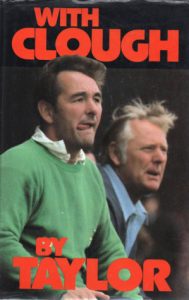Book Review: With Clough, By Taylor (with Mike Langley)
 This book was originally published in October 1980 (cover right), and at that time the Clough and Taylor partnership was still going strong, with Nottingham Forest having collected a second European Cup triumph following a 1-0 win over a Hamburg side in Madrid containing Kevin Keegan. Within two years Peter Taylor resigned from Forest and took up the management of rivals Derby County from November 1982 to April 1984 and it was during this period that he and Brian Clough fell out, never to reconcile before Taylor’s death in October 1990 of pulmonary fibrosis while on holiday in Mallorca, at the age of just 62. This republishing of With Clough, By Taylor (cover below left) is sold with royalties donated to Action for Pulmonary Fibrosis (www.actionpulmonaryfibrosis.org)
This book was originally published in October 1980 (cover right), and at that time the Clough and Taylor partnership was still going strong, with Nottingham Forest having collected a second European Cup triumph following a 1-0 win over a Hamburg side in Madrid containing Kevin Keegan. Within two years Peter Taylor resigned from Forest and took up the management of rivals Derby County from November 1982 to April 1984 and it was during this period that he and Brian Clough fell out, never to reconcile before Taylor’s death in October 1990 of pulmonary fibrosis while on holiday in Mallorca, at the age of just 62. This republishing of With Clough, By Taylor (cover below left) is sold with royalties donated to Action for Pulmonary Fibrosis (www.actionpulmonaryfibrosis.org)
 Given this is a republishing almost forty-years later, the reader has the benefit of all the events post the original release in 1980 and therefore makes it a different read. For instance, back then any reader, given what the pair had achieved up to that point, might have comfortably assumed that there were more years of success to follow, whereas in fact within two years Clough and Taylor were no longer a partnership. And in some ways, it is interesting to see this reflected in the two covers from 1980 and the 2019 publications. The 80s version has the men together deep in concentration, focused on the action in front of them, whereas the latest edition sees them sat before the start of the 1980 European Cup Final, seemingly together but portraying a distance as well. It may simply be that they are nervous ahead of such a major game, or that they are uncomfortable with the intrusive nature of the photographers. However, given that the pair never reconciled after their row surrounding the John Robertson transfer, the current image may well have been chosen to reflect the split.
Given this is a republishing almost forty-years later, the reader has the benefit of all the events post the original release in 1980 and therefore makes it a different read. For instance, back then any reader, given what the pair had achieved up to that point, might have comfortably assumed that there were more years of success to follow, whereas in fact within two years Clough and Taylor were no longer a partnership. And in some ways, it is interesting to see this reflected in the two covers from 1980 and the 2019 publications. The 80s version has the men together deep in concentration, focused on the action in front of them, whereas the latest edition sees them sat before the start of the 1980 European Cup Final, seemingly together but portraying a distance as well. It may simply be that they are nervous ahead of such a major game, or that they are uncomfortable with the intrusive nature of the photographers. However, given that the pair never reconciled after their row surrounding the John Robertson transfer, the current image may well have been chosen to reflect the split.
Of the content of the book itself, it follows a fairly chronological line of their time together and apart, starting with the initial meeting as players at Middlesbrough, where Taylor was a goalkeeper and Clough a centre-forward. It then documents their first managerial job at Hartlepools United, the triumph, trials and tribulations at Derby County, the time at Brighton & Hove Albion together and then with Taylor solely in charge and finally their tenure at Nottingham Forest. These parts of the book all feel fairly understated and it is not until Taylor comes onto other topics, in particular, Clough’s 44 days at Leeds United, Taylor’s views on the England team and the players in the game that he admired, that as a reader we get to see an animated side of his character and get to read about Taylor’s undoubted understanding of players and their respective talents.
That Clough and Taylor were two different characters is reflected in the number of books about Clough, given the persona he portrayed to the world and his penchant for the outspoken and controversial, as the paucity of titles about Peter Taylor, who admitted himself, was uncomfortable in front of the media. The fact is that the pair were highly successful, and their different personalities and skills ensured that, as Clough acknowledged, “I’m not equipped to manage successfully without Peter Taylor. I am the shop window and he is the goods in the back.”
The ending of the book is on reflection a sad footnote, with Taylor stating, “Both of us are aware that it (our partnership) cannot last for ever and that we must part again one day. I hope we part on a high note and on the friendliest terms, and that football will remember us as pioneers of management – the first to see that two heads are better than one.” Clough and Taylor will always be remembered as a unique and successful partnership and indeed will always be part of football history and folklore, the pity though is that their friendship never had that chance of a final reconciliation.
(Biteback Publishing, 24 Jan. 2019. Paperback 288pp)
